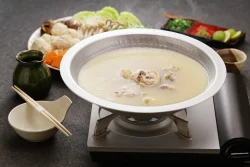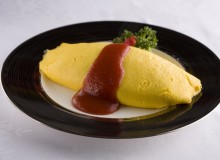
Originally published on metropolis.co.jp on December 2010

Photos by Josh Rogers
“What kind of restaurant makes you cook your own food?” asked an indignant Bill Murray in Lost in Translation. It’s obvious that Bob didn’t come to Japan in winter, when huddling around the flames of a yakiniku grill is just as enticing as the fresh meat it cooks up.
Budget barbecue houses are ten a penny in Japan, but usually the meat is average at best. Not so at Taijuen, a Korean chain with seven restaurants around town: here, every mouthful is a delicious, tender cut, served in laidback surrounds where gentle jazz and the crackling of meat over charcoal invite you to linger.
On the most recent of many visits, we started with a complimentary bowl of bean sprouts and a kimchi assortment (¥620 small/¥690 large). Although Taijuen’s kimchi isn’t as spicy as in the motherland, it went nicely with a bottle of makgeolli (¥650 300ml/¥1,600 700ml)—sweet and creamy, with a slight fizz.
The table was prepared with four dipping sauces: tare (try adding a little grated garlic), lemon, ponzu and sesame. Then came a small dish of yukhoe (raw egg and tare over firm, thinly sliced raw beef; ¥390) and a plate of thin, soft tongue for the barbecue (¥990). We also grilled a generous order of assorted vegetables (¥520), including a shallow metal dish of sliced garlic in oil that, once roasted, went down beautifully with our slices of beef.
Ah yes: beef, the main attraction at any yakiniku joint. And at Taijuen, we could eat it till the cows come home. Best of the bunch was the “tsubozuke” galbi (¥790), a long roll of under-rib meat that you cut with scissors while grilling. The galbi was marinated in tare or herb salt and presented with vegetables in a small urn. It was truly the star of the show, although the “value”
galbi (¥590) was also plenty tasty, and a far cry from the chewy gristle you get at chains such as Gyu-Kaku.
 Mind you, if chewy is your thing, try the mino (¥590), chunks of rumen tripe made from the lining of the first chamber of the cow’s stomach. Juicier options included chicken thigh (¥420) and tontoro (fatty pork; ¥590), both of which were succulent and went fantastically well with the lemon dip. Still hungry? We also enjoyed a “medium” yukhoe bibimbap (it was huge; ¥750), and wakame soup, rich orange jelly and hot green tea, all of which were served gratis.
Mind you, if chewy is your thing, try the mino (¥590), chunks of rumen tripe made from the lining of the first chamber of the cow’s stomach. Juicier options included chicken thigh (¥420) and tontoro (fatty pork; ¥590), both of which were succulent and went fantastically well with the lemon dip. Still hungry? We also enjoyed a “medium” yukhoe bibimbap (it was huge; ¥750), and wakame soup, rich orange jelly and hot green tea, all of which were served gratis.
Yakiniku is truly slow food, and no one’s trying to hurry you out at Taijuen. The restaurant’s ambience suggests a much higher price tag, and, as an extra aid to conversation, extractor fans are built into the rim of each grill instead of an obstructive chimney shaft. Kick off your shoes, order another makgeolli, and find out what those closest to you have got cooking.







